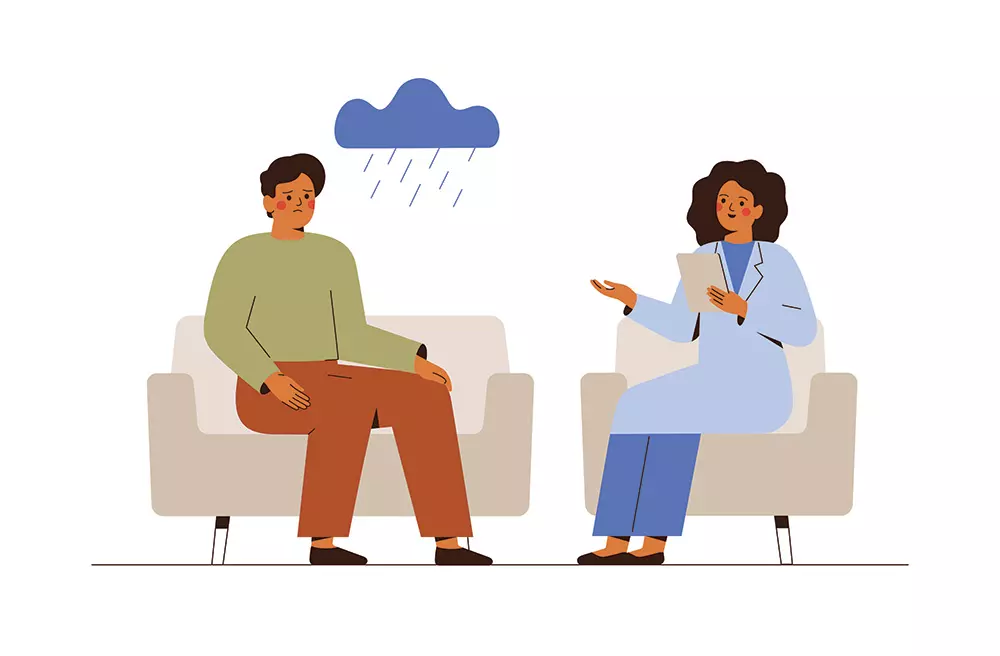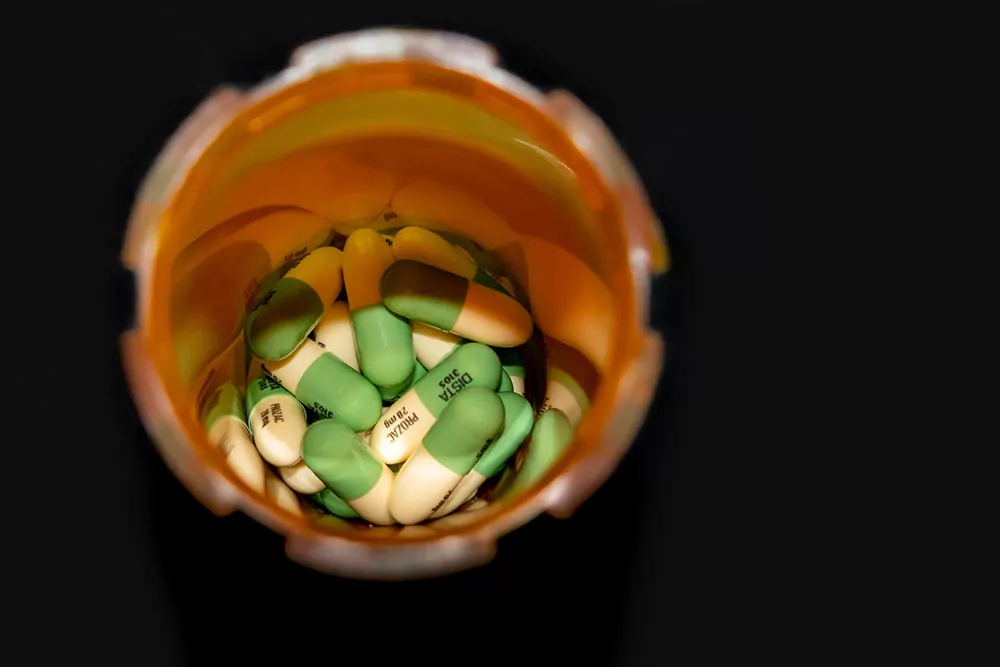Although most people have familiarity with depression, having known a loved one who’s experienced it, seen many depictions in the media, or experienced it themselves, there’s still a lot of misunderstanding surrounding this disorder.
Depression (“major depressive disorder” or “clinical depression”) is classified as a mood disorder. While everyone may experience bouts of sadness or hopelessness, especially surrounding times of trauma or grief, depression itself is different. In order to receive a formal diagnosis of depression or a depression-related disorder, symptoms must be present for a certain period of time, though past experience, family history, and other factors are also important to a diagnosis. Depression can affect anyone at any time, so it’s important for everyone to know what it looks like. By understanding depression, you can be more prepared to identify it in yourself or a loved one and seek help in a timely manner.
@eleanor_health Let’s chat: What is depression? ?? #EleanorHealth #mentalhealthmatters #therapistsontiktok
♬ original sound – Eleanor Health
Though it is often talked about generally as just a feeling of sadness, depression can present itself in different forms, each of which can impact people in very different ways. Some of the most common forms of depression and depression-related disorders include:
This is what many people often mean when they refer to depression. Major depressive disorder refers to diagnosable depression that doesn’t fall into another form of depression (i.e. it isn’t occurring postpartum, it doesn’t relate to seasonal changes, etc.). A diagnosis may begin broadly with clinical depression and evolve into a more specific diagnosis as the medical or mental health professional learns more about the individual’s symptoms, experiences, and other circumstances.
Seasonal affective disorder is a form of depression that is associated with the changing of the seasons. It is typically associated with the winter months due to the loss of sunlight, drastic shifts in temperature, and other cultural shifts around this time. Seasonal depression has a pattern of recurring around the same time each year, though proper treatment can help resolve it or prevent the intensity of its impact.
Depression is often associated with hormonal changes and major life events, both of which are especially true in the cases of prenatal and/or postpartum depression. People who experience pregnancy and the birth of a child go through many physical, hormonal, and emotional changes over a relatively short period. This experience leads many to experience depression as a result, which can feel incredibly overwhelming alongside both the societal expectations placed on new parents (mothers, in particular) and newfound responsibilities. It may make it more difficult for them to enjoy this new stage of life, partake in daily activities, and care for themselves or their baby.
Bipolar disorder is a mental health condition that differs from forms of clinical depression. Rather than solely experiencing periods of depression, those with bipolar disorder also experience episodes of mania, depending on their exact diagnosis. Mania is characterized by periods of intense excitement or euphoria, which can lead to other dangerous behaviors and risks.
Beyond these few, there are many other forms that depression can take and similar disorders that may look like depression on the surface. If you think you may be experiencing depression or a related condition, talk to your doctor and reach out to trusted people for help.
Symptoms may vary from person to person, depending on each individual’s circumstances. Not all symptoms may be present and other symptoms not appearing on this list may be related to depression.
Some common symptoms associated with depression and related disorders are:
If you or a loved one have been experiencing one or more of these for a prolonged period (often at least two weeks) and/or they’re negatively impacting you at home, work, or school, talk to your doctor about the possibility of depression. Certain symptoms may be more severe than others and a few carry a higher risk, especially relating to self-harm. Professional advice, particularly mental health care, should be sought immediately when thoughts of harm are involved.
Depression can affect anyone at any time, regardless of age, race, gender, income, and other demographic differences. There are, however, genetic, environmental, physiological, and other factors that increase an individual’s risk of developing depression. The factors that tend to most impact someone’s risk include:
Although there are clear risk factors for developing depression, no one knows exactly what causes it. One thing that psychologists do know is that biological differences in someone’s brain chemistry can play a large role in the development of depression and other mood disorders. Specifically, recent research indicates that changes in certain chemicals or neurotransmitters in the brain may contribute to someone’s risk of depression. Hormone changes in the body can also contribute to depression, as is often the case with postpartum depression. However, not everyone who has brain differences or hormonal changes develops depression, so these factors can’t be proven causes of the disorder.
Researchers also consider co-occurring disorders by studying the causes and risks of mental health issues. Depression often occurs alongside another mental health disorder or medical problem. Those with existing mental health concerns like ADHD, PTSD, anxiety, and others are at a higher risk of developing depression, as are those with illnesses like cancer, multiple sclerosis, Parkinson’s, and more. Those with a dual diagnosis of two existing disorders need to address both issues in treatment to find long-term relief.
Though depression can seem like a very scary mental health condition, treatment is often incredibly effective and accessible. Even the most severe cases of depression are completely treatable. Modern technology often means that treatment can even be sought from the comfort of your home via video call, phone call, mobile app, and text messaging. Therapy is one of the most effective tools in treating depression.
Depending on the potential cause(s) of an individual’s depression, something as simple as attending a weekly session with a licensed therapist to talk through thoughts and problems can be life-changing. Trained professionals can help someone more clearly identify unhealthy thoughts and behaviors to get to the root of a problem. They can also provide powerful techniques and coping mechanisms to help redirect thoughts, understand feelings, and adapt behaviors, which can be hugely impactful. Though therapy is sometimes made out to be overly simplistic by those who may not understand it, coping mechanisms and other practices taught in therapy can have a real, measurable impact on someone’s experience with depression on physical, mental, emotional, and social levels.
There are many cases in depression treatment where medication is also used in conjunction with therapy. One of the most common categories of medication used to treat depression is known as Selective-serotonin reuptake inhibitors (SSRIs). Essentially, this type of medication works by preventing the body and brain from absorbing serotonin, which is a chemical that is naturally produced in the brain and is associated with mood stabilization as well as other functions. This allows for more serotonin to remain present, which could aid in reducing or resolving symptoms of depression.
SSRIs, like citalopram (Celexa), escitalopram (Lexapro), sertraline (Zoloft), bupropion (Wellbutrin), and others, are often a starting point for doctors when providing medication. However, there are many types of medications that can be prescribed, depending on an individual’s response to SSRIs, medical history, and other circumstances. If someone has a dual diagnosis or co-occurring disorder, using medication that directly treats the other disorder may also be more effective at easing depression symptoms.
In all cases, treatment plans are entirely individual. Because the exact cause of depression is unknown and it impacts people of all different circumstances, what works in treating one person may not work for someone else. To find the best treatment, talk to your doctor about what is right for you. No matter what your circumstance, treating depression is entirely doable with a little help.
Unfortunately, many who deal with depression often turn to substances as a way of coping. They may not be aware that depression is the disorder causing their emotional distress or they may lack a support system to effectively help them through it. If they turn to drugs and alcohol, they may become dependent, which can lead to the development of a substance use disorder.
Almost a third of people with depression experience a co-occurring substance use disorder. Those who deal with both are left with greater risks of death from self-harm or overdose.
If you feel you turn to substances to cope with depression and may have a substance use disorder, it’s important to be upfront with your doctor or mental health professional in your depression treatment. Treatment for a dual diagnosis will differ from typical depression treatment and effectively managing both disorders is crucial to ensuring your long-term health and recovery.
If you are seeking help with your loved one’s addiction, contact us today or complete our quick contact form below, to speak with an addiction treatment specialist.
If you need help with your substance use disorder, we are here to help you build your confidence and momentum towards the future you want. We provide treatment services for adults with alcohol, opioid, and other substance use disorders. We are currently located in Louisiana, Massachusetts, New Jersey, North Carolina, Ohio, Texas, and Washington.
 Natural Treatments for Depression: Can They Help?
Natural Treatments for Depression: Can They Help?
 What is Prozac? (Fluoxetine)
What is Prozac? (Fluoxetine)
 Alcohol and Depression: A Cycle
Alcohol and Depression: A Cycle